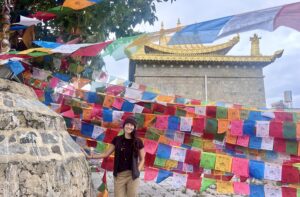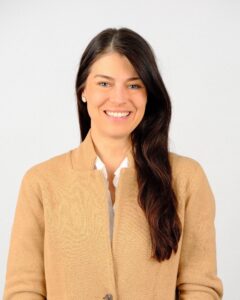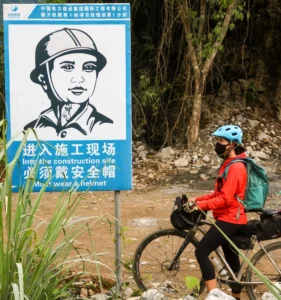Saturday Plenary Spotlight
“From biking in Laos to rare earths in China: Geography as curiosity in motion”
 This talk weaves stories from the field with reflections on teaching and research to show how geography is a practice of learning and a way of being in the world. From teaching in China to disaster research in Nepal to ethnographies of railway construction in Laos, I reflect on how mentors, students, and fieldwork have shaped my path as a geographer and my approach to engaged research and teaching. I highlight geography as a practice of critical thinking and of world-making. Through these practices, I aim to situate questions in their social, political, and historical contexts; recognize power relations; and remain attentive to multiple scales. Such historically informed spatial thinking is essential for making sense of today’s urgent challenges, from climate and energy to equity and justice. Drawing on my research, I connect big themes—development, environment, and geopolitics—with what it means to teach, research, and learn today. My hope is to spark reflection on why curiosity, critical thinking, and place-based research matter more than ever—and how educators and students can carry geography’s power into the world.
This talk weaves stories from the field with reflections on teaching and research to show how geography is a practice of learning and a way of being in the world. From teaching in China to disaster research in Nepal to ethnographies of railway construction in Laos, I reflect on how mentors, students, and fieldwork have shaped my path as a geographer and my approach to engaged research and teaching. I highlight geography as a practice of critical thinking and of world-making. Through these practices, I aim to situate questions in their social, political, and historical contexts; recognize power relations; and remain attentive to multiple scales. Such historically informed spatial thinking is essential for making sense of today’s urgent challenges, from climate and energy to equity and justice. Drawing on my research, I connect big themes—development, environment, and geopolitics—with what it means to teach, research, and learn today. My hope is to spark reflection on why curiosity, critical thinking, and place-based research matter more than ever—and how educators and students can carry geography’s power into the world.
About the Speaker
JESSICA DiCARLO, Ph.D.,
Assistant Professor of Geography | Core Faculty, Environmental Humanities | Affiliated Faculty, Asian Studies
 Dr. Jessica DiCarlo is a human geographer and political ecologist. At the University of Utah, she is an Assistant Professor in the School of Environment, Society & Sustainability, and Faculty in Environmental Humanities and Asian Studies. She is also a 2023-25 Public Intellectual Program Fellow with the National Committee on US-China Relations and a 2023-24 Wilson China Fellow.
Dr. Jessica DiCarlo is a human geographer and political ecologist. At the University of Utah, she is an Assistant Professor in the School of Environment, Society & Sustainability, and Faculty in Environmental Humanities and Asian Studies. She is also a 2023-25 Public Intellectual Program Fellow with the National Committee on US-China Relations and a 2023-24 Wilson China Fellow.
Dr. DiCarlo writes broadly on resource politics, global China, and geopolitics. Her expertise is centered on China, and her interest in borderlands motivated research and work across Southeast, Central, and South Asia. It is informed by several years in the NGO and education sectors in Tibet and China, where I began working in 2008. Her research has been published in Dialogues in Human Geography, Antipode, Transactions of the Institute of British Geographers, Geoforum, Ecology and Society, Geopolitics, Area, Ambio, Extractive Industries and Society, Globalizations, and in multiple books; she is the co-editor of The Rise of the Infrastructure State (Bristol University Press 2022). She uses multi-sited, multi-scalar, and multi-lingual methods to conduct immersive and socially engaged research, and is committed to long-term fieldwork and rely on ethnography to connect meticulous, ground-level cases with global processes.
She is on the editorial board of The People’s Map of Global China and Global China Pulse journal, both within Global China Lab. She is the co-founder of the Second Cold War Observatory and a New Books Network podcast host. Dr. DiCarlo was elected an At-Large Councilor (2024-26) for the Cultural & Political Ecology (CAPE) specialty group of the American Association of Geographers. She was previously a Postdoctoral Fellow at The University of British Columbia, a Global China Fellow at Boston University’s Global Development Policy Center (2019), a Research Fellow at the University of Bern’s Centre for Development and Environment in Laos (2018-20), a USAID Research and Innovations Fellow in India (2015), and a Princeton-in-Asia Fellow in Dalian, China (2009-10). She earned her Ph.D. in Geography at the University of Colorado Boulder and masters in Development Studies at the University of California Berkeley.
Jessica is interested in working with students and scholars on research that develops novel insights on topics related to global China, critical minerals and energy transition, and more. She is an avid outdoors person, whether backpacking in the Himalayas, canyoneering in Utah, skiing with her huskies, or cycling (and eating) her way around Taiwan.
Beyond the Keynote: Jessica DiCarlo’s Work
Explore Dr. Jessica DiCarlo’s current projects, publications, and fieldwork, and hear her speak about her research. Visit her website and watch a recent interview to learn more about her research and impact.

